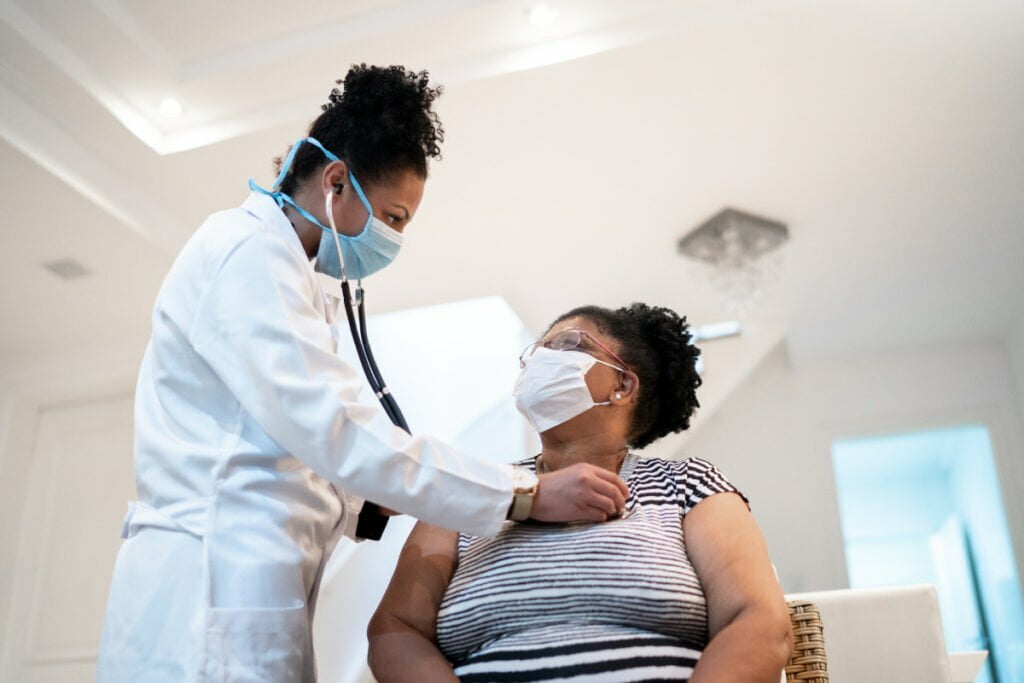Can Obesity Increase Your Risk of Contracting COVID-19? Research Says “Yes”

It’s well-known that obesity can cause a myriad of health problems for those who suffer from it, but did you know that it can also increase one’s risk of contracting the coronavirus? In this post, we examine the correlation between obesity and COVID-19, and how weight loss surgery can help. Let’s dive in.
Obesity and COVID-19 are related
According to the CDC, over 70% of US adults are overweight or obese, defined as having a BMI greater than 30. Obesity can cause health issues such as diabetes, hypertension, fatty liver disease, sleep apnea, heart attack, stroke, kidney disease, and even death—as well as a heightened risk of developing a severe form of COVID-19 that may require hospital care and ventilator support.
Obesity weakens the immune system
Obesity is a complex disease caused by multiple factors that weaken the immune system. Carrying a significant amount of body fat can cause the body to produce excess cytokines, which are small proteins that trigger an immune response. In a non-obese person, the production of cytokines is a healthy physiological response to an infection; however, in an obese person, a constant release of cytokines puts the body in a state of chronic inflammation because it can’t “recover” from the attack it perceives. Essentially, an obese person’s immune system is always set to overdrive.
The correlation between diminished immune function and COVID is twofold. First, if the immune system is constantly under attack, an obese person is more susceptible to contracting a disease like COVID. Second, like any other infection, COVID-19 can also trigger the immune system to release cytokines, which can further increase inflammation in obese individuals.
Obesity increases the risk of pre-existing conditions for COVID
Because of its inflammatory side effects, obesity also increases one’s risk of cardiovascular disease, diabetes, kidney disease, and COPD, all of which make COVID-19 infection more likely. As an example, during the H1N1 outbreak of 2009, researchers discovered that obese patients were more likely to contract the virus and require longer stays in ICUs than non-obese patients.
Obesity can exacerbate COVID symptoms
Obesity can decrease lung capacity and oxygen levels, making breathing more difficult. As a result, many patients with obesity have underlying lung conditions, such as sleep apnea, asthma, and obesity hypoventilation syndrome, all of which can exacerbate COVID-19 symptoms.
In fact, one Obesity Research & Clinical Practice study found that the need for a ventilator increased 5-fold among obese participants who contracted COVID compared to non-obese participants, and nearly 4 times as many obese participants required hospitalization for the virus. The need for supplemental oxygen following COVID-19 infection has also been shown to increase among patients with higher BMIs. At a time when ventilators, supplemental oxygen, and hospital beds are in short supply, obese patients who contract COVID are at serious risk of not having their medical needs met.
Obesity may affect vaccine efficacy
Vaccines can be less predictable in obese patients than non-obese patients. Consider these studies:
- According to a 2017 International Journal of Obesity study, there was an increase in flu contraction from vaccinated obese patients compared to vaccinated non-obese patients during the 2013-14 and 2014-15 flu seasons
- A 1985 Journal of the American Medical Association study found that healthcare workers with higher BMIs were less likely to develop antibodies to the Hepatitis B vaccine
- Similarly, a 2006 Autoimmunity journal study reported lower antibody response to tetanus immunization in overweight 13-year-olds compared to their leaner peers
It’s important to note, however, that obesity and vaccine efficacy is an area requiring further research, and vaccines offer much-needed and proven protection for the great majority of patients, regardless of weight. We urge everyone eligible for the COVID-19 vaccine to receive it.
Bariatric surgery as prevention
A 2020 Cleveland Clinic study showed that among obese patients who tested positive for COVID-19, those who had previously undergone bariatric surgery had a 50% lower risk of requiring hospitalization. Additionally, 13% of patients who hadn’t had bariatric surgery required ICU admission, 7% needed a ventilator, and 2.4% died, none of which occurred among weight loss surgery patients.
A 2020 Cleveland Clinic study showed that among obese patients who tested positive for COVID-19, those who had previously undergone bariatric surgery had a 50% lower risk of requiring hospitalization.
Other benefits of weight loss surgery
Bariatric surgery doesn’t just lower one’s risk for COVID-19; it can also improve diabetes, hypertension, fatty liver disease, and sleep apnea, as well as prevent cardiovascular diseases, stroke, kidney disease, and even death. At Inland Weight Loss, our patients also regularly experience the benefit of discovering a newfound sense of confidence, pride, and appreciation for their bodies after undergoing weight loss surgery.
Weight loss surgery in Rancho Cucamonga & the Inland Empire
To learn more about how weight loss surgery can improve your quality of life and physical health, we invite you to schedule a consultation with us today. Our cosmetic surgery team specializes in medical weight loss and has helped thousands of patients in Rancho Cucamonga and the Inland Empire lose weight and gain a new appreciation for their bodies. Contact us online or call (909) 579-3111 to learn more.
